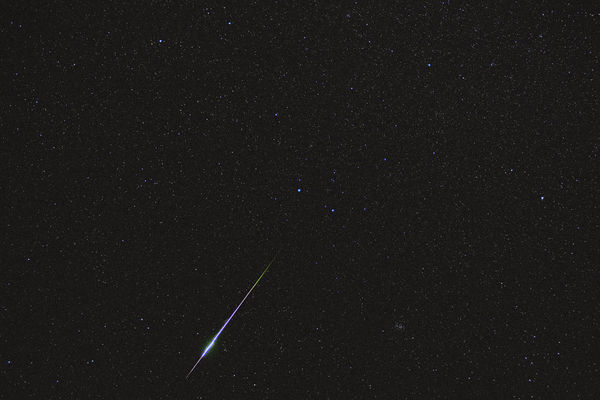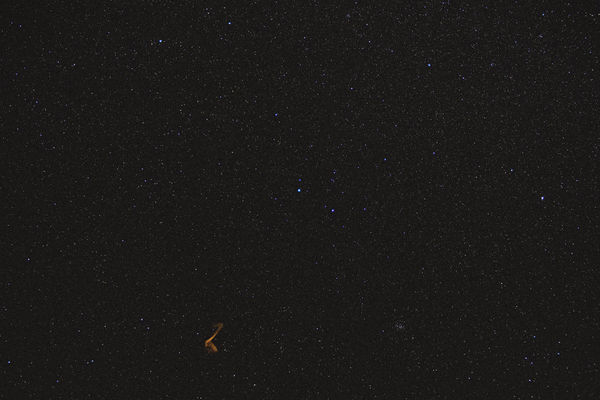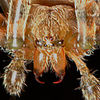A single Orionid Meteor & resulting "Dust Train"
Oct 29, 2012 20:53:45 #
First image: A single Orionid meteor taken on the night of Oct. 21, 2012 at 6:29 AM. Camera was Canon T2i, lens 18-55mm kit lens set at 18mm, f/3.5, ISO 3200. Exposure was 31-seconds, this is a single exposure and not image-stacked. Area of sky was almost straight overhead. An artificial Flat Frame was created from the original exposure and subtracted in PE-9. Camera was mounted on an iOptron EQ Smart mount. North is to the left; west is up. The two bright stars are Castor and Pollux in constellation Gemini, the large Galactic Cluster M-44 (Praesepe Cluster) is to the right of the meteor.
Second image: same data, but this one reveals the rapidly expanding dust trail or train (whichever you prefer to call it) left by descending meteor.
Second image: same data, but this one reveals the rapidly expanding dust trail or train (whichever you prefer to call it) left by descending meteor.
Meteor

Dust Train

Oct 29, 2012 21:55:04 #
Oct 29, 2012 22:14:48 #
Nikonian72 wrote:
Good question, evidently they emit their own light and glow, the mechanism behind this phenomenon is not completely understood.Is the 'Dust Train' illuminated by sunlight, or glows on its own?
See: http://www.imo.net/docs/04trains.pdf
Oct 29, 2012 23:52:36 #
Nikonian72 wrote:
I would think that the light comes from heated particles that melt off of the body, as it traverses the atmosphere. I once witnessed such a train following a "shooting star" through a telescope, and it gradually dimmed out disappearing rather after the unaided eye could detect the glow. It was much like the after glow of burned out filaments of a light bulb.Is the 'Dust Train' illuminated by sunlight, or glows on its own?
In daylight a large specimen sometimes leaves behind a smoke train that dissipates in a while.
Oct 30, 2012 07:18:55 #
First off, spectacular shot! I live in a very clear area in west Texas. I've never noticed this, but never really "looked" for it. The shape of the trail is very interesting! Can't wait to give this type of shot a try. I'm curious how long the train is visible after the meteor burns up? Also, were you using noise reduction on or off? I've never tried to reduce noise from long exposures like this in post, but that 31 second exposure x2 would make it 62 seconds and one might miss the dust trail!
Robert
Robert
Oct 30, 2012 11:03:18 #
Thank you rodart. I did have noise reduction off. I also mount my camera on an equatorial mount but a tripod would do as well, if you kept the exposures short enough not to leave star trail (actually for meteors it doesn't really matter). I also use an Aputure timer remote controller attached to the Canon T2i. I set it to take 30 second exposures with a pause of 7 seconds between shots (to allow for download time). Once set up I can go do something else or sit back and watch for meteors with my eye. I do pause the process every ten minutes or so to check for dew condensation on the lens which if present I remove with a hair dryer. To save batteries, I also use an AC adapter hooked directly into the camera. If a meteor does appear and a train is left then the set up should capture it. I recorded two that night but this one was the best. When converted over to avi files for a movie they take on a whole new aspect in appearance.
Oct 30, 2012 11:10:53 #
Almost forgot to answer about duration of train. It lasted through 8 shots or 4 minutes. It may have lasted longer because high altitude winds were moving it towards the edge of the frames until it finally left the photo. Not all meteors produce visible trains but the Orionids in October and the Leonids of November are usually reliable to produce them.
If you want to reply, then register here. Registration is free and your account is created instantly, so you can post right away.



